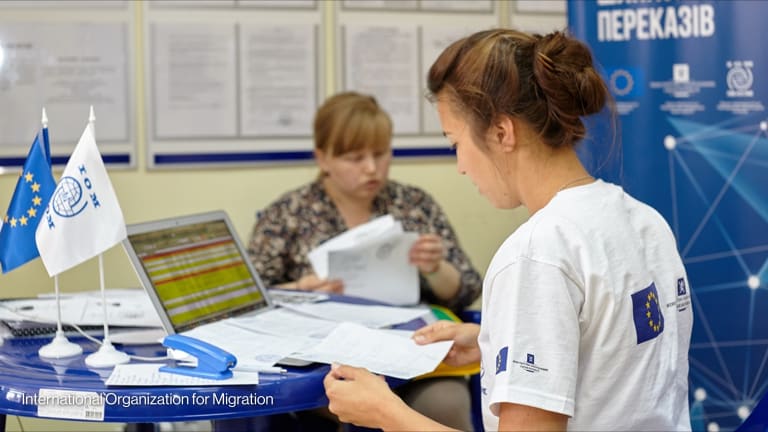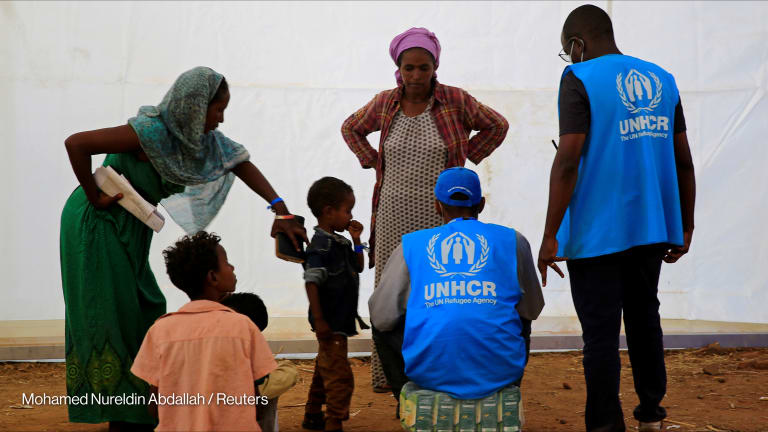Working in Ukraine: What organizations need in war response
Staff leaders from leading NGOs working in Ukraine tell Devex how their mission has evolved since the war began and what global development job seekers who want to make an impact in the region need to know.
As the war in Ukraine proceeds through its second year with no end in sight, global development organizations have had to readjust strategies and navigate evolving challenges since the onset of the conflict. “We have to design and adapt programs to specific local contexts,” said Lorenzo Violante, a regional operations manager for the International Federation of Red Cross and Red Crescent Societies. “We have the same standards and overall needs, but may need to curate certain programs to local needs and circumstances. Particularly, where so many different languages are spoken, different contexts in more than a dozen countries.” Due to high demand for certain skill sets and expertise, organizations have also found themselves competing for talent. “A large number of NGOs entered Ukraine in response to the invasion, creating high levels of competition for talented staff,” said Svitlana Ogorodnyk, the director of human resources in Ukraine for International Medical Corps. Devex spoke to three leading professionals involved with their organization’s Ukraine response to get a sense of how they are adapting for the long road ahead and what global development job seekers who want to make an impact in the region need to know to meet their staffing needs. Have your staffing priorities, including the types of positions needed, and desired skill sets, related to your Ukraine response changed over the course of the last year, and if so, how? Julian Zakrzewski, Ukraine country director, Danish Refugee Council: DRC has been present in Ukraine, with interruptions, since 1998 and was immediately able to capitalize on more than 200 skilled and experienced colleagues involved primarily in protection and humanitarian mine action — most of whom had worked for DRC for many years when the conflict escalated in February 2022. The focus of our assistance prior to the escalation focused on long-term programming such as the capacity building of duty bearers, mine clearance, victim assistance, and explosive ordnance risk education rather than emergency response as such even though that is our global expertise. Our staff was displaced as well — many of them multiple times — following the offensive launched one year ago. We needed to swiftly readjust to a different way of working, and due to the speed and scale of the crisis, and the risks associated with working in areas close to or in battle zones, we needed more staff and staff with specific skills, knowledge, and contextual understanding and we recruited increasingly staff with prior extensive emergency experience in complex, large displacement crisis. We also scaled up our technical teams working on protection programming significantly trying to cope with the huge needs. In the past year, we have increased our teams to now count more than 400 staff with the expectation to increase further in the course of 2023. Lorenzo Violante, regional operations manager, IFRC: The IFRC provides strategic and operational coordination across 42 Red Cross and Red Crescent National Societies who are responding domestically to support people who have fled the international armed conflict in Ukraine, many of whom have received funds through our IFRC appeal. The main change since the conflict began is less of a reliance on this system of one, two-month-long deployments to actual longer-term recruiting. The recruiting has now shifted from international recruitment to local recruitment, the talent exists in this region and it makes the most sense to hire locally. The global network allows for the agility and flexibility in a high-paced emergency environment while we fully understand the organizational structure and needs in each. There are multiple crises ongoing worldwide as the recent Turkey quake highlighted, and so our global network is running on all cylinders to alleviate human suffering and deliver aid. This crisis has involved more than a dozen countries where numerous languages are spoken and this really tested our global network. We may need to hire people who can speak and understand local contexts — not only Ukrainian, but also other local languages across the region where displacement has taken place. After relying on existing networks, we began to hire international recruits and then shifted to more national recruitments. At the moment, we are looking to hire more local, national staff. That expertise exists locally, you don’t need to bring in a community engagement or logistics expert to Ukraine, that expertise is there. There is a lot of local talent. Svitlana Ogorodnyk, director of human resources in Ukraine, IMC: Our staffing efforts and priorities have shifted according to our programs. As a humanitarian organization focused on medical assistance and training, we initially focused on medical positions. Then, as our programs expanded — for example, into health care facility repair and strengthening that involved construction — we began to focus on such positions as engineers and construction specialists. Throughout our response, we have focused on the administrative positions needed to provide services including HR, logistics, finance, etc. What challenges have you faced and strived to overcome over this past year in terms of fulfilling your mission in Ukraine? JZ, DRC: Prior to the escalation in conflict, our offices were located in the East — in Luhansk, Donetsk, and Mariupol — in territory that is now under the control of the Russian Federation. This meant that all our staff were displaced in February or March, some inside Ukraine, others to Russia or Europe. Trying to support our own staff — personally and professionally — and at the same time ensuring that we were responding to escalating needs was tremendously difficult for a humanitarian organisation whose mandate it is to support people in need and often under the most difficult of circumstances at the contact line. It took some time to regroup, adapt, and adjust, and in the process, we launched extensive collaboration with local partners as a way to support and work with local civil society and initiatives. In a parallel track, we worked to further develop the approach and respond in a new and entirely changed reality and context. We have, in just a few months, managed to establish broad geographical presence to be able to reach people across the country. When recruiting for national staff positions, we faced great challenges finding staff and often needed to advertise positions several times before a candidate could be found. The pool of experienced humanitarian workers was quickly depleted with many new organisations and U.N. agencies coming in or scaling up. While we were not as affected as local NGOs, we had a significant number of staff seeking new challenges in other organisations as offers were plenty for staff with experience. LV, IFRC: There is a lot of competition in many countries, particularly neighboring countries to Ukraine. We face competition from other international organizations and agencies as well as the private sector. Sometimes, we’ve had to revert to international recruitment because we were not successful in recruiting for a specific position locally, which we really prefer not to do. Finding talent for some of the more supportive functions, like finance and HR, is a challenge, [especially finding those] who also know the language and context. We understand how difficult it is for our staff to work in an ongoing conflict like Ukraine, particularly for our Ukrainian staff. It is incredibly challenging on a personal and psychosocial level to have to hide in a bunker because of an air raid, and they have their own families to worry about. We applaud our volunteers and staffers’ commitment to our mission, particularly within Ukraine itself. We offer hardship allowances, childcare, as well as psychosocial support. We have rest and relaxation time for both national and international staff. We understand that few recruits can work for more than a year under these conditions. We also offer a winterization package for our local staff to minimize the impact of the power cuts. We also have a flexible hours policy for all our staff, not just in Ukraine. We are grateful for our amazing staff throughout the region with high workloads, specifically those bravely working within Ukraine itself. SO, IMC: There were a number of challenges that affected our efforts, including the number of people who left Ukraine after the invasion or who relocated to the safer Western regions affected the labor market. The NGO labor market is also new for Ukraine, meaning candidates did not initially actively apply to NGO positions. It was quite difficult to find an ideal combination of skills and passion for such work. In some cases, this meant we sometimes trained people and/or “upskilled” them as they worked. Finding English-speaking specialists was another challenge. Because many of our top-level experts, especially early in the response, are expatriates and most of our internal processes and policies are in English. English was and remains a critical skill for more than 70% of the positions we recruited in Ukraine. In other words, we were initially challenged by a lack of qualified specialists on the market in general, and English-speaking staff in particular. Yet despite these challenges, we have been able to recruit talented staff who have performed quite well. Looking ahead, what are your staffing priorities related to your Ukraine response in the coming months? JZ, DRC: We continue to be looking for staff across all program sectors with a key focus on protection — including lawyers, psychologists and social workers — and humanitarian mine action being a DRC core capacity and field of experience. And we also look staff for staff for our support departments including HR, supply chain, and finance. At the same time, we see effects on people of the prolonged emergency response with long hours of work, unpredictability and a stressful working environment which are all factors that are exhausting colleagues and can potentially lead to burn out. We have in-house counseling and other mechanisms that staff can access and we encourage that people try to stick to normal working hours as much as possible. But the situation is very difficult for staff in key positions who are not so easy to substitute and who, in some instances, are covering for three or four colleagues at the same time. LV, IFRC: As the international armed conflict in Ukraine sees no end in sight, the impact on the people inside the country and across the region are far reaching. It will take years and years to recover as millions start over their lives in new countries. As the IFRC network, we will continue to be there on the long journey ahead, which will require ongoing long-term resources. This is why it is so critical that we look at how we resource this operation not just for the next year, but for many years ahead. In addition, the communities hosting the people fleeing Ukraine as well as people from Ukraine themselves are best placed to support and respond in the long run. This is why we will continue to prioritize hiring locally. In addition, the negative mental health impacts are immense, we will be scaling up our work now with the largest mental health project in our history in Europe. This will include looking at more psychosocial support profiles. In addition, it is important we do more to engage and involve the people we help in how we design our programming. This means more profiles including in community engagement and accountability as well as protection, gender & inclusion. Cash and voucher assistance will continue to be an operational priority — this means more profiles that support our work across Europe will be critical. SO, IMC: We have the same priorities as before when it comes to hiring specialists, but we are expanding our activity to new locations, including newly liberated territories. We do now have an additional focus: to ensure our organizational capability and success for the future, and to develop current national staff. This strategy will enable us to give people an opportunity for professional and career development, and to fill critical positions by promoting capable internal specialists. Most important, it enables us to retain and increase the engagement of talented staff who have a passion for the organization and its work, and are interested in career opportunities here. We also continue to recruit actively within the local labor markets. We are working hard to increase awareness of our organization — our brand is a significant component of our recruitment strategy and can significantly influence the quantity and quality of potential candidates, as well as the perception of our organization among current staff.
As the war in Ukraine proceeds through its second year with no end in sight, global development organizations have had to readjust strategies and navigate evolving challenges since the onset of the conflict.
“We have to design and adapt programs to specific local contexts,” said Lorenzo Violante, a regional operations manager for the International Federation of Red Cross and Red Crescent Societies. “We have the same standards and overall needs, but may need to curate certain programs to local needs and circumstances. Particularly, where so many different languages are spoken, different contexts in more than a dozen countries.”
Due to high demand for certain skill sets and expertise, organizations have also found themselves competing for talent.
This article is exclusively for Career Account members.
Unlock this article now with a 15-day free trial of a Devex Career Account. With a Career Account subscription you will get:
- Full access to our jobs board, including over 1,000 exclusive jobs
- Your Devex profile highlighted in recruiter search results
- Connections to recruiters and industry experts through online and live Devex events
Start my 15-day free trialAlready a user?
Printing articles to share with others is a breach of our terms and conditions and copyright policy. Please use the sharing options on the left side of the article. Devex Pro members may share up to 10 articles per month using the Pro share tool ( ).
Justin is a contributing writer and editor who previously led Devex’s careers content strategy. Before joining Devex, Justin served as the managing editor of Springwise, covering sustainable and climate-tech innovation across all business sectors. He also spent over 13 years as an editor and writer for the New York Times, specializing in digital content production and strategy while producing written and multimedia content on a range of topics, including travel, sports, and technology.








